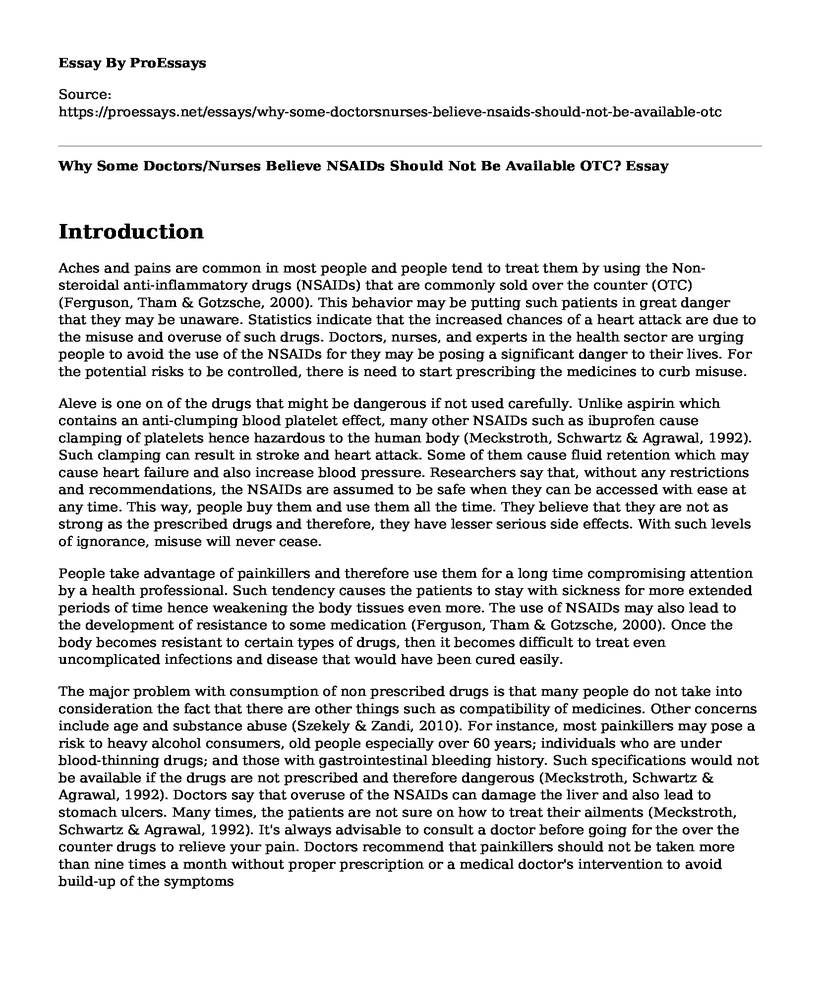Introduction
Aches and pains are common in most people and people tend to treat them by using the Non-steroidal anti-inflammatory drugs (NSAIDs) that are commonly sold over the counter (OTC) (Ferguson, Tham & Gotzsche, 2000). This behavior may be putting such patients in great danger that they may be unaware. Statistics indicate that the increased chances of a heart attack are due to the misuse and overuse of such drugs. Doctors, nurses, and experts in the health sector are urging people to avoid the use of the NSAIDs for they may be posing a significant danger to their lives. For the potential risks to be controlled, there is need to start prescribing the medicines to curb misuse.
Aleve is one on of the drugs that might be dangerous if not used carefully. Unlike aspirin which contains an anti-clumping blood platelet effect, many other NSAIDs such as ibuprofen cause clamping of platelets hence hazardous to the human body (Meckstroth, Schwartz & Agrawal, 1992). Such clamping can result in stroke and heart attack. Some of them cause fluid retention which may cause heart failure and also increase blood pressure. Researchers say that, without any restrictions and recommendations, the NSAIDs are assumed to be safe when they can be accessed with ease at any time. This way, people buy them and use them all the time. They believe that they are not as strong as the prescribed drugs and therefore, they have lesser serious side effects. With such levels of ignorance, misuse will never cease.
People take advantage of painkillers and therefore use them for a long time compromising attention by a health professional. Such tendency causes the patients to stay with sickness for more extended periods of time hence weakening the body tissues even more. The use of NSAIDs may also lead to the development of resistance to some medication (Ferguson, Tham & Gotzsche, 2000). Once the body becomes resistant to certain types of drugs, then it becomes difficult to treat even uncomplicated infections and disease that would have been cured easily.
The major problem with consumption of non prescribed drugs is that many people do not take into consideration the fact that there are other things such as compatibility of medicines. Other concerns include age and substance abuse (Szekely & Zandi, 2010). For instance, most painkillers may pose a risk to heavy alcohol consumers, old people especially over 60 years; individuals who are under blood-thinning drugs; and those with gastrointestinal bleeding history. Such specifications would not be available if the drugs are not prescribed and therefore dangerous (Meckstroth, Schwartz & Agrawal, 1992). Doctors say that overuse of the NSAIDs can damage the liver and also lead to stomach ulcers. Many times, the patients are not sure on how to treat their ailments (Meckstroth, Schwartz & Agrawal, 1992). It's always advisable to consult a doctor before going for the over the counter drugs to relieve your pain. Doctors recommend that painkillers should not be taken more than nine times a month without proper prescription or a medical doctor's intervention to avoid build-up of the symptoms
Conclusion
The solution to problems related to NSAIDs is to ensure that the drugs are not sold over the counter without a medical practitioner's prescription (Meckstroth, Schwartz & Agrawal, 1992). This action will help the consumers of such drugs to visit their doctors and get more information concerning their health. For instance, an alcohol addict may not understand the effects of drinking while on drugs until he/she meets with a qualified medical practitioner to elaborate on the dangers involved.
References
Ferguson, H., Tham, T. C. K., & Gotzsche, P. C. (September 02, 2000). Non-steroidal anti-inflammatory drugs. BMJ, 321, 7260, 568.
Meckstroth, S., Schwartz, M., & Agrawal, N. (July 01, 1992). NSAIDs: Safety Implications of Over-the-Counter Availability. Drug Safety, 7, 4, 241-244.
Szekely, C. A., & Zandi, P. P. (April 01, 2010). Non-steroidal anti-inflammatory drugs and Alzheimer's disease: The epidemiological evidence. Cns and Neurological Disorders - Drug Targets, 9, 2, 132-139.
Cite this page
Why Some Doctors/Nurses Believe NSAIDs Should Not Be Available OTC?. (2022, May 23). Retrieved from https://proessays.net/essays/why-some-doctorsnurses-believe-nsaids-should-not-be-available-otc
If you are the original author of this essay and no longer wish to have it published on the ProEssays website, please click below to request its removal:
- Type 2 Diabetes, Hypertension, Heart Disease and Obesity Essay
- Psychological and Social Aspects of Health Education Essay Example
- Research Paper on Exploring Teen Pregnancy in Low-Income Communities: An In-Depth Interview Study
- Essay on Neisseria Meningitis: Deadly Pathogen-Host Interaction
- Coronavirus Outbreak: Impact on U.S. and European Stocks - Essay Sample
- Free Report Sample on Obesity in the Workplace: Potential Adverse Effects and How to Manage
- Nurse Deb's Case: Evidence Needed to Win Wrongful Termination Suit - Case Study Example







